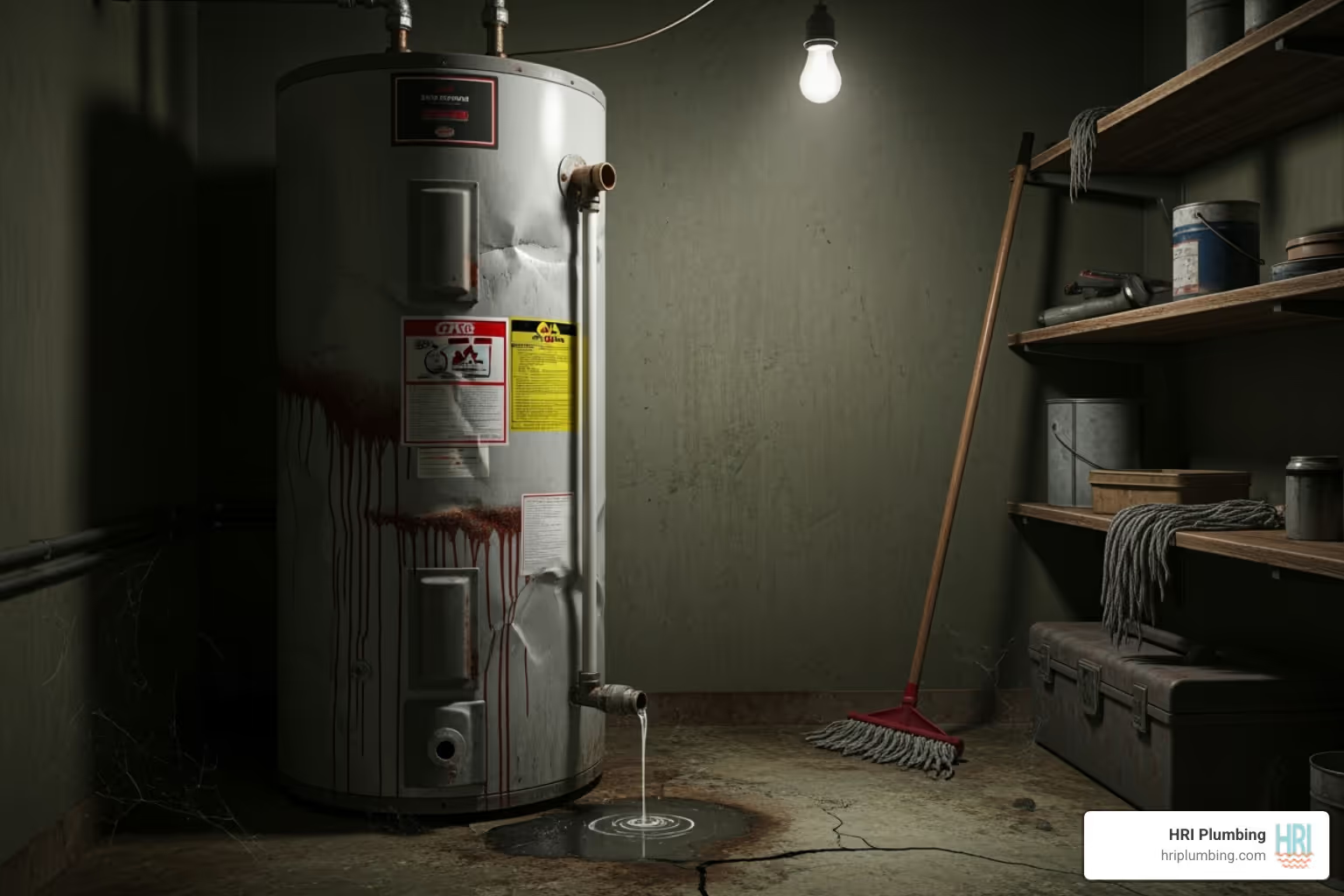Why Your Water Heater Stops Working (And What to Do About It)
Water heater not heating is one of the most frustrating problems homeowners face. Nothing ruins your morning like stepping into a freezing cold shower or finding your dishes won't get clean because there's no hot water.
Quick Solutions for Common Water Heater Problems:
- Electric water heaters: Check if the circuit breaker tripped, then look for a reset button on the unit
- Gas water heaters: Verify the pilot light is lit and the gas supply valve is open
- Both types: Confirm thermostat is set between 120-140°F and tank size matches your household needs
- Immediate safety check: If you smell gas, turn off the gas supply and call a professional immediately
The good news? Many of these problems have straightforward solutions you can handle yourself. Others require professional help for safety reasons - especially anything involving gas lines or electrical components.
Water heaters typically last about 10 years, but regular maintenance can extend their life and prevent sudden failures. Understanding the basic troubleshooting steps helps you know when you can fix it yourself and when to call for backup.
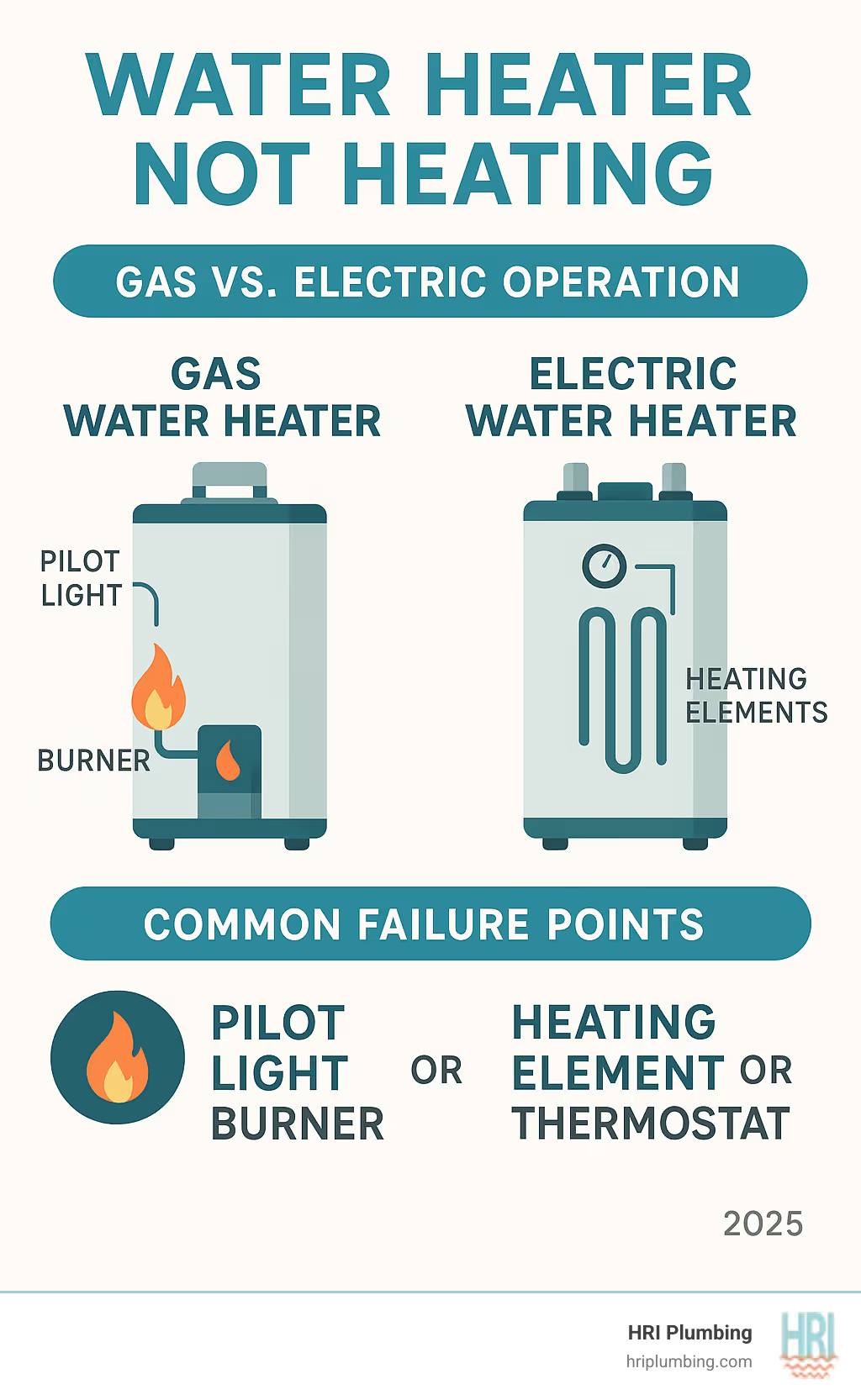
Your Step-by-Step Guide When Your Water Heater is Not Heating
When your hot water suddenly vanishes, it feels like your whole morning routine just got derailed. But here's the good news: most water heater not heating problems have straightforward solutions, and we're going to walk you through them step by step.
First Steps: Universal Checks for Any Water Heater
Before we get into the nitty-gritty of electric versus gas units, let's start with the basics. These simple checks work for any water heater and often solve the problem without any complicated repairs.
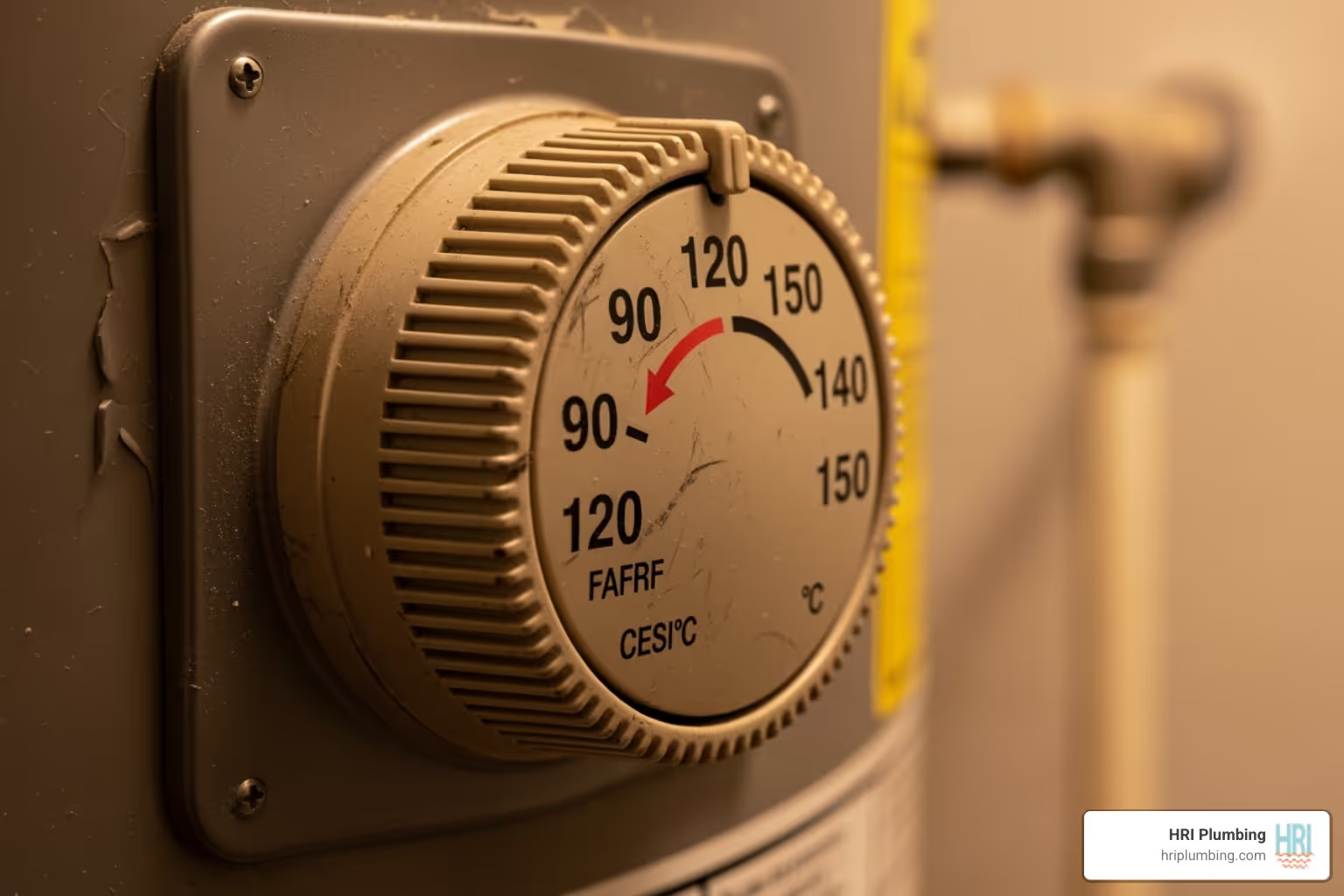
Check your thermostat setting first. Your water heater should be set between 120-140 degrees Fahrenheit. We recommend starting at 120 degrees - it's safe, energy-efficient, and hot enough for most households. If your water feels lukewarm, the thermostat might have gotten bumped down accidentally.
Setting it below 120 degrees can risk bacteria growth, while settings above 140 degrees pose a scalding hazard, especially for children. The U.S. Department of Energy's Energy Saver: Water Heating page offers guidance on finding a safe, energy-efficient balance.
Consider if your tank is simply too small. An undersized tank is a common cause for running out of hot water. If your household has grown or your hot water usage has increased (e.g., long showers, running multiple appliances), your tank may no longer meet your needs. A family of five or more often needs at least a 50-gallon unit.
Watch out for sneaky mixing valve issues. A faulty mixing valve could be the culprit, blending cold water with hot before it reaches your faucet. This can result in lukewarm water and is common in older homes or after recent plumbing work.
Factor in your water heater's age. If your unit is over 10 years old, replacement might be more cost-effective than repair. Aging heaters suffer from corrosion, failing parts, and reduced efficiency. Our guide on Signs Your Water Heater Needs Repair or Replacement can help you decide.
Troubleshooting an Electric Water Heater Not Heating
When an electric water heater not heating, the problem is usually a faulty electrical component.
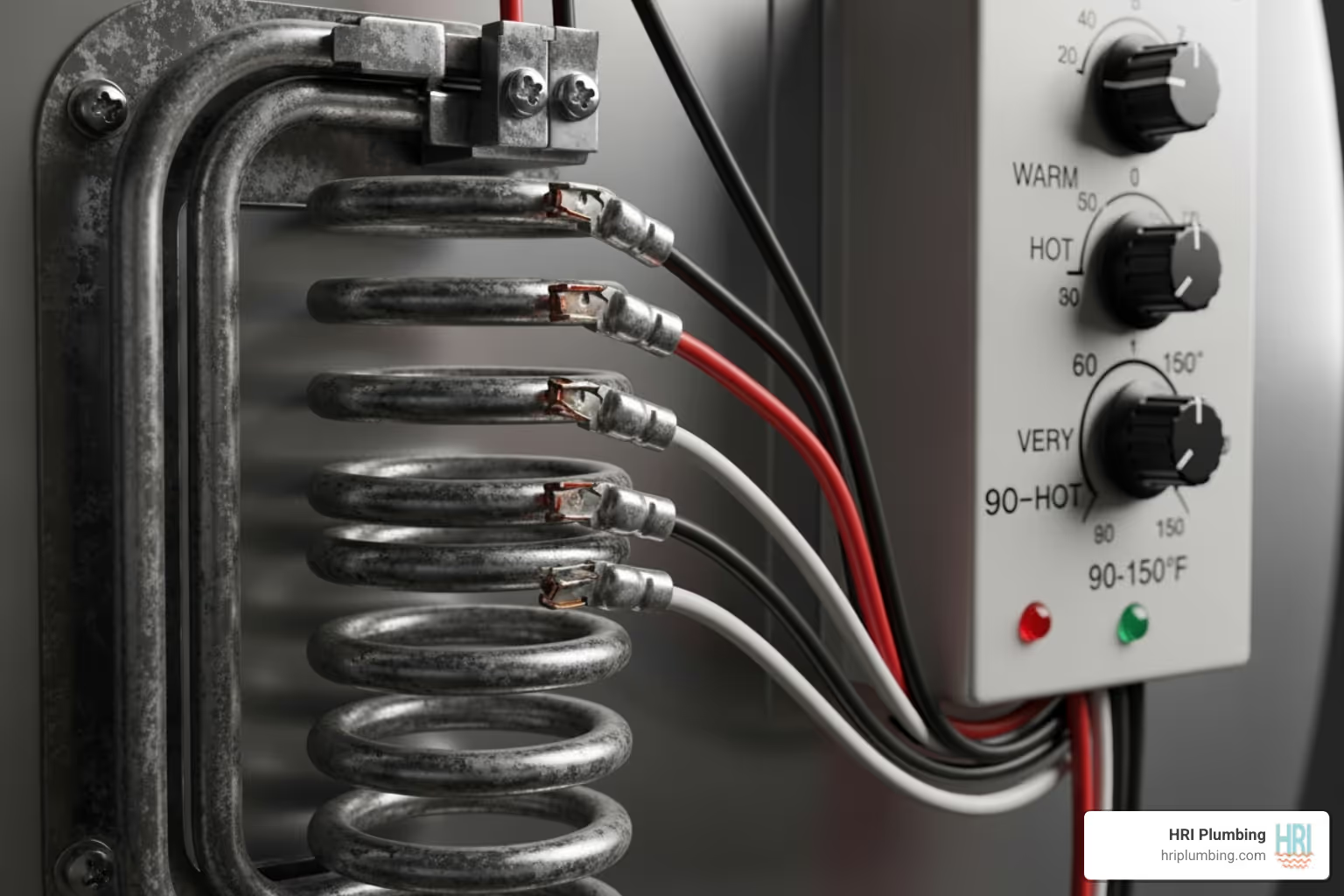
Start with your circuit breaker. Head to your electrical panel and look for a tripped circuit breaker. Flip it back to "on." If it trips again immediately, stop. A repeatedly tripping breaker indicates a serious electrical problem that needs a professional.
Look for the reset button. Electric heaters have a high-temperature cutoff switch with a reset button, often under a cover on the control panel. You can push it to reset, but if it keeps tripping, it indicates a larger problem like a faulty thermostat or heating element.
Test your thermostats and heating elements. Electric heaters have upper and lower thermostats and heating elements. A failure in any of these can lead to lukewarm or no hot water. Testing these parts with a multimeter is risky due to high voltage. For safety, it's best to Contact HRI Plumbing for Professional Help to diagnose and replace any faulty heating elements.
Solving Common Gas Water Heater Problems
When a gas water heater not heating, the issue typically involves the gas supply or ignition system.
Check if your pilot light is out. This little flame should burn continuously, ready to ignite the main burner when you need hot water. If it's out, your burner won't fire up at all.
How to relight a pilot light safely: If you smell gas, stop, turn off the gas supply, leave your home, and call the gas company. If not, turn the gas knob to "OFF" for 10 minutes. Then, turn to "PILOT," press and hold the pilot button, and click the igniter. Hold the button for a minute after it lights, then release. If the flame stays on, turn the knob to "ON."
If your pilot light won't stay lit, you likely have a faulty thermocouple. This safety device shuts off gas if it can't sense the flame. A dirty or worn-out thermocouple needs replacement, which can be tricky on newer units.
Check your gas supply and valve issues. Check that the main gas supply valve is fully open (parallel to the pipe). A clogged or defective gas valve can also be the issue. A healthy pilot flame is blue and steady; yellow or flickering flames indicate a problem like dirty burners that needs professional attention.
Gas work is dangerous. When in doubt, call us for Water Heater Repair Springfield, IL to diagnose the problem safely.
Maintenance, Safety, and When to Call a Professional
Regular maintenance is like insurance for your water heater - a little effort now prevents big headaches later. The most important task is dealing with sediment buildup.
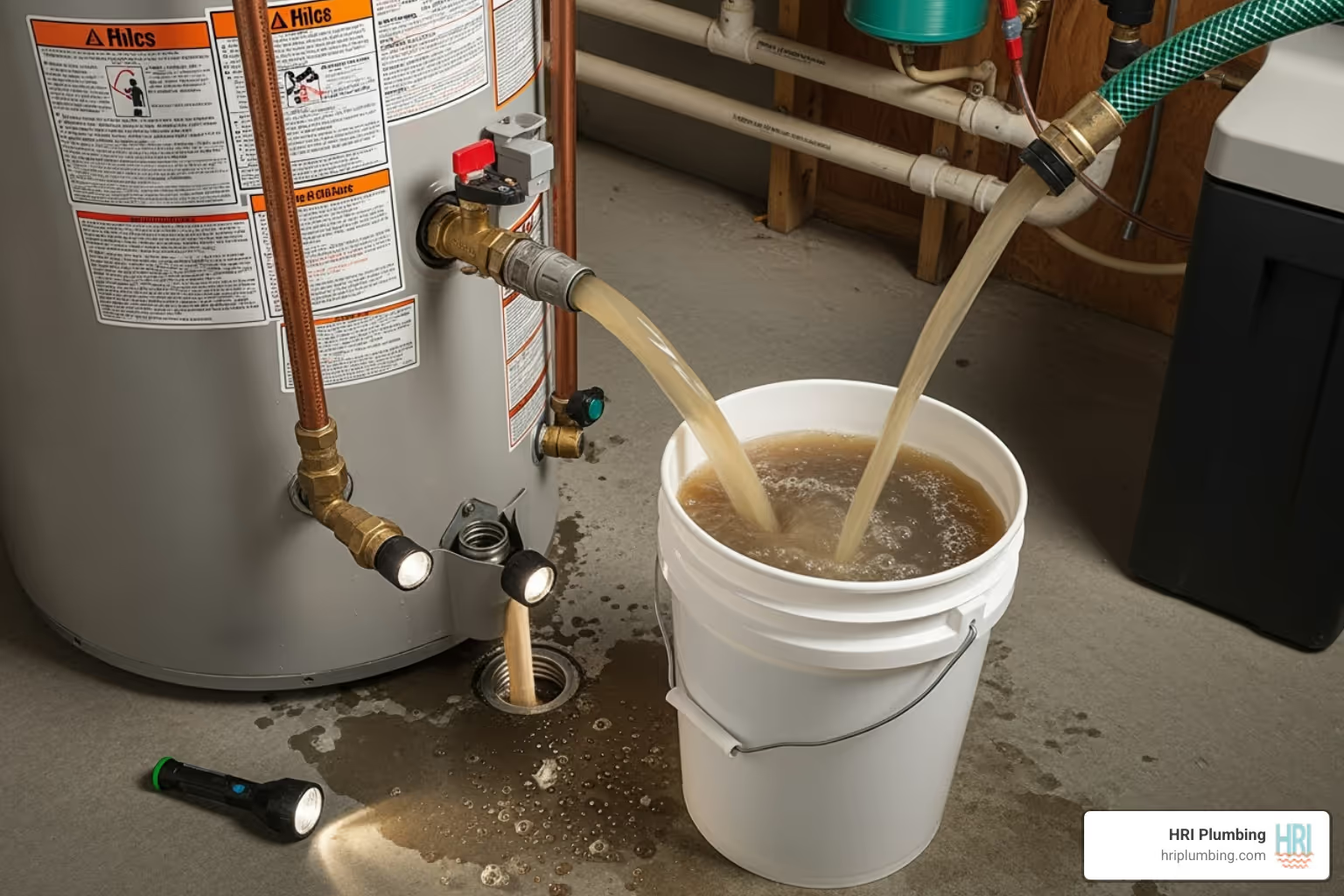
Annual flushing is essential, especially with hard water, to prevent sediment buildup. Minerals settle at the bottom, insulating the tank and reducing efficiency, which can cause popping or rumbling noises. The process involves draining the tank until the water runs clear. Since it's time-consuming and requires shutting off the power or gas, many homeowners prefer professional maintenance.
Don't forget about your anode rod. The anode rod is a "sacrificial" part that protects your tank from rust. Regular replacement during maintenance extends your water heater's life. Learn more in our post about Sediment Buildup and Potential Water Heater Issues.
Safety precautions are non-negotiable. If you smell gas leaks (rotten eggs), turn off your home's gas supply, evacuate immediately, and call your gas company. For electric units, always turn off power at the circuit breaker before doing any work. Electrical shock risk is high around water.
When to call a professional: Call a professional if you smell gas, the tank is leaking, the circuit breaker keeps tripping, or the pilot light won't stay lit. Also, if your unit is over 10 years old and having issues, replacement is often more economical. If you're not comfortable with gas or electrical work, call for help.
Get Your Hot Water Flowing Again
When your water heater not heating, it can feel like your whole world has turned upside down. Nobody wants to start their day with an ice-cold shower or face a sink full of dishes that just won't get clean without hot water.
The good news is that most water heater problems have clear solutions. Whether you're dealing with a tripped circuit breaker on your electric unit, an extinguished pilot light on your gas water heater, or simply a thermostat that needs adjusting, many of these issues are more manageable than they first appear.
Regular maintenance is your secret weapon against unexpected breakdowns. That annual flushing we talked about? It's not just busy work - it genuinely prevents the sediment buildup that can turn your efficient water heater into an expensive paperweight. Checking your anode rod and keeping an eye on your unit's overall condition can add years to its life.
But here's the thing - and this is important - some repairs should always be left to the professionals. If you smell gas, see water pooling around your tank, or find yourself constantly resetting tripped breakers, it's time to step back and call for backup. There's no shame in knowing your limits, especially when safety is on the line.
DIY repairs are great for simple fixes, but complex electrical, gas, or internal tank issues require professional expertise. Risking your home's plumbing system isn't worth it.
At HRI Plumbing, we handle everything from pilot light relights to full system replacements. We offer 24/7 support in Jacksonville, Springfield, Rushville, and surrounding areas to get your hot water flowing again safely and efficiently.
Don't let another cold shower ruin your morning. Whether you need emergency repairs, routine maintenance, or help deciding between repair and replacement, we're just a phone call away.


